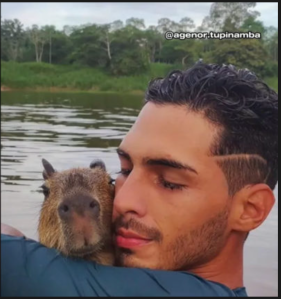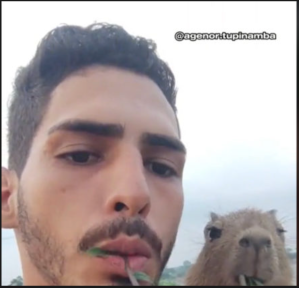Figuring out if you can legally own a pet capybara is often more complicated than actually getting one. Each region of the world has distinct regulations, regardless of whether capybaras are native to your area. For example, possessing them in Brazil is prohibited.
Recently, I came across a video featuring a young Brazilian with his pet capybara, which immediately raised concerns for me. What was this young man thinking? Was he unaware that keeping capybaras as pets in Brazil is illegal? Despite showing obvious love and proper care for his pet, I foresaw an inevitable heartbreak. As predicted, he eventually had to hand over his pet to the authorities, who will rehabilitate and release it into the wild. The Brazilian agency handling this is quite proficient, and I fully trust their capabilities.
As mentioned below, the original video has since been removed. I doubt there are any remaining photos except for those included in this article. For your convenience, I have copied and pasted the text, excluding the links and statements from Agenor and IBAMA.

photo credit: Agenor Tupinamba
Ribeirinho Agenor Tupinambá garnered widespread attention on social media after posting videos featuring his daily life with a wild animal, ultimately receiving a fine of R$ 17,000.
On Thursday, April 27, 2023, the 23-year-old influencer Agenor Tupinambá, who became a social media sensation with his capybara “Filó,” turned the animal over to IBAMA (Brazilian Institute for the Environment and Renewable Natural Resources).
Tupinambá and “Filó” traveled from their home in Autazes to Manaus. In the capital, the capybara will be cared for by CETAS (Wild Animal Screening Center) to facilitate its reintroduction into the wild.

photo credit: Agenor Tupinamba
In a farewell post on Instagram, Tupinambá emphasized that he was always in favor of the animal’s reintegration and did not profit from his posts.
“It is important to note that I was never against it and would never prevent my beloved Filomena from one day joining a flock of capybaras to follow her life. That’s exactly why I saved her, cared for her and kept a huge feeling in my chest for her.”, he shared on the social network.
“I also know that mistakes have happened, and I guarantee that the mistakes I made were unconscious, without ill-nature or any attempt at exploitation. Absolutely no video with her brought me any financial results. It was just me with a cell phone in my hand, recording my own riverside life”, he added.
The pair became viral sensations in February after their daily routines were widely shared on social media.
On April 18, IBAMA fined Tupinambá for “undue exploitation of wild animals to generate content on social networks.” He was given a deadline of six days—until April 24—to turn in the capybara and fined R$ 17,030.00. Additionally, he was required to delete all content involving the capybara and other wild animals from his social media accounts.
The institute elaborated that “in addition to being a crime to keep wild animals illegally,” displaying them as pets on social media “creates demand for these animals, thereby fueling the wildlife trafficking industry.”

photo credit: Agenor Tupinamba
“No matter how well-intentioned helping a wild animal by giving it food and shelter may be, it is essential to understand that this can compromise its survival skills in nature. Additionally, wild animals can transmit serious diseases to humans.,” IBAMA warned.
Regarding the legality in your own area, the situation can be complex. Capybaras are legal in Texas but not in California. In Washington State, where I reside, they are legal. However, they are not allowed in all cities within the state. If you belong to a homeowner’s association, be wary of their stringent rules. Furthermore, while owning a dog is legal almost everywhere, if that dog bites someone, it becomes illegal. My recommendation is to verify regulations at the federal, state, county, and city levels, and confirm that you are not in a restrictive neighborhood.



